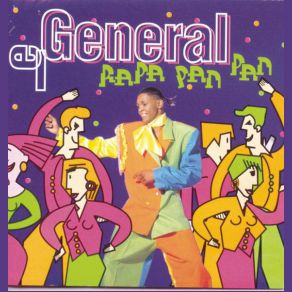Rapa Pan Pan
Download links and information about Rapa Pan Pan by El General. This album was released in 1997 and it belongs to Latin genres. It contains 11 tracks with total duration of 43:39 minutes.

|
|
|---|---|
| Artist: | El General |
| Release date: | 1997 |
| Genre: | Latin |
| Tracks: | 11 |
| Duration: | 43:39 |
| Buy it NOW at: | |
| Buy on iTunes $9.99 | |
| Buy on Amazon $9.99 | |
Tracks
[Edit]| No. | Title | Length |
|---|---|---|
| 1. | Rapa Pan Pan | 3:40 |
| 2. | El Clavo | 4:02 |
| 3. | Samba Hey | 4:04 |
| 4. | Una Fiesta | 3:40 |
| 5. | La Medicina | 3:32 |
| 6. | Poema II | 3:50 |
| 7. | Pata Pata Bum Bum | 3:54 |
| 8. | Lambón | 3:46 |
| 9. | ¡Que Linda! | 3:51 |
| 10. | Adam's Fiesta (Noche de Fiesta) | 4:23 |
| 11. | Sama Power Fiesta (Noche de Fiesta) | 4:57 |
Details
[Edit]The Panamanian dancehall DJ shakes up his musical approach again here, but strangely seems to be going back to the music from whence his rapid-fire vocal flow came. "Poema II," "Lambón," and "Qué Linda!" are straight-up, skanking ragga tracks with guitar sneaking in for occasional adornments to an electronic sound based on keyboards (including bass), percussion, and vocals. "Samba Hey" ventures into different territory — the samba means Brazilian samba school and it's hard to argue with the power of the drums, a simple repeated chorus, and the Latin undertow and chorus that veer close to "Tequila." The title track is a capsule bio of his life and career with an electronic arrangement, while "La Medicina" gets a nice groove working topped by vocal harmonies. "Una Fiesta" is carried by Anayka melodically before El General chips in to make his points, and the "Poema II" duet with her is pure ragga groove with horn commentaries and lyrics dealing with the plight of homeless street kids. But the other Jamaican tracks work by virtue of familiarity more than anything, and the rest of Rapa Pan Pan is pretty spotty. "Adam's Fiesta," one of two remakes of "Noche de Fiesta" from Clubb 555, heads for the four-on-the-floor dancefloor drums before techno-keyboarding into a vocal breakdown. The second, "Sama Power Fiesta," is even more techno-oriented and even less interesting, with static rhythms and sirens going off. You never doubt that El General is working hard to vary his music (and more than likely introducing part of his audience to new sounds and ideas), but he also seems to be losing something as he grows more conscious of song techniques. "El Clavo" may hold the key to the disc as a whole — it has its moments and you get the impression El General is doing exactly what he wants with the sound, but it doesn't hook you enough to escape the lightweight zone.